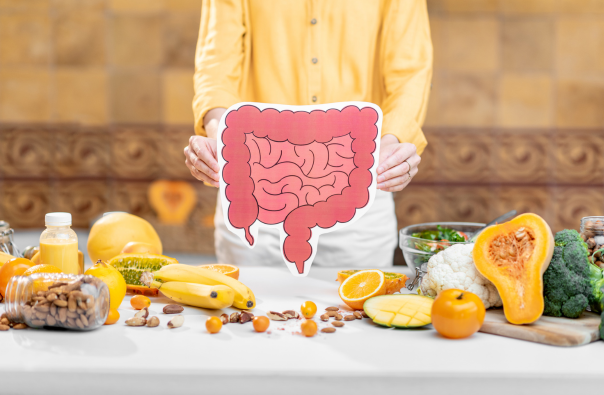Want to know how to improve gut health naturally? When it comes to overall wellness, one area that often gets overlooked is our gut health. The health of our digestive system plays a crucial role in our overall well-being, affecting everything from our immune system to our mental health.
In this ultimate guide, we will explore why gut health is important, the signs of poor gut health, and the factors that can affect it.
Why is gut health important?
Gut health is important for several reasons.
- Food Breakdown. Our tummy breaks down food and takes out the good stuff.
- Nutrient Absorption. A happy tummy helps us use the good things in our food.
- Tiny Helpers. Trillions of bacteria live in our tummy. They’re like bodyguards for our immune system.
- Immune System Support. These tiny helpers fight off bad germs, making our immune system strong.

Signs of poor gut health
There are several signs that may indicate poor gut health.
- Digestive issues. Bloating, gas, and constipation are common issues.
- Food Intolerances. Problems with certain foods or frequent infections might be a sign.
- Skin Problems. Acne or eczema could indicate an unhappy gut.
- Mental Health Conditions. Poor gut health is linked to anxiety and depression.
Factors that affect gut health
Several factors can impact the health of our gut. Diet plays a major role, as consuming a diet high in processed foods, sugar, and unhealthy fats can disrupt the balance of bacteria in our gut. Stress is another major factor, as it can negatively impact the diversity of our gut microbiota. Lack of sleep, sedentary lifestyle, and certain medications like antibiotics can also affect our gut health. Understanding these factors can help us make informed choices to improve our gut health naturally.
How to improve gut health naturally
Improving gut health naturally starts with making changes to our diet and lifestyle. By incorporating certain foods, vitamins, and supplements into our routine, we can support the health of our gut and promote overall wellness. Let’s explore some of the best practices for improving gut health naturally.
The role of diet in gut health
The food we eat has a direct impact on our gut health. A diet rich in fiber is key to promoting a healthy gut. Fiber acts as fuel for the beneficial bacteria in our gut, helping them thrive. Foods high in fiber include fruits, vegetables, whole grains, and legumes. Additionally, fermented foods like yogurt, sauerkraut, and kimchi are rich in probiotics, which are beneficial bacteria that can improve gut health.
Best foods for gut health
Incorporating certain foods into our diet can have a positive impact on our gut health. Prebiotic foods such as garlic, onions, and bananas provide nourishment for the beneficial bacteria in our gut. Omega-3 fatty acids found in fatty fish like salmon and mackerel have anti-inflammatory properties that can reduce gut inflammation. Bone broth is another excellent choice, as it contains collagen and amino acids that support gut lining repair.
Key vitamins and supplements for gut health
In addition to a healthy diet, certain vitamins and supplements can further support gut health. Probiotic supplements, which contain live bacteria, can help restore the balance of our gut microbiota. Digestive enzymes can aid in the breakdown of food and improve digestion. Glutamine, an amino acid, can help repair the lining of the gut. Lastly, omega-3 supplements can provide additional anti-inflammatory benefits.
Lifestyle changes for better gut health
Incorporating lifestyle changes can also have a positive impact on our gut health. Managing stress through practices like meditation, deep breathing, and regular exercise can help support a healthy gut. Prioritizing good quality sleep is essential, as sleep deprivation can disrupt the balance of our gut microbiota. Regular exercise not only supports overall well-being but also helps promote a healthy gut.
Stress management
Stress has a profound impact on our gut health. When we are stressed, our body releases stress hormones that can disrupt the balance of our gut microbiota. Incorporating stress management techniques into our daily routine can help minimize this impact. Practices like meditation, yoga, and spending time in nature can help reduce stress levels and support a healthy gut.
Health and exercise
Regular exercise is not only beneficial for our physical health but also for our gut health. Exercise helps stimulate the muscles in our digestive system, promoting healthy digestion. It also supports the diversity of our gut microbiota, helping maintain a healthy balance of bacteria. Aim for at least 30 minutes of moderate-intensity exercise most days of the week for optimal gut health.
Gut health and sleep
Sleep is often overlooked when it comes to gut health, but it plays a crucial role. Lack of sleep can disrupt the balance of our gut microbiota and increase inflammation in the body. Aim for 7-9 hours of quality sleep each night to support a healthy gut. Establishing a regular sleep schedule, creating a relaxing bedtime routine, and optimizing your sleep environment can all contribute to better sleep and improved gut health.
Probiotics
Probiotics are beneficial bacteria that can improve gut health when consumed in adequate amounts. They can be found in certain foods like yogurt and kefir, as well as in supplement form. When choosing a probiotic supplement, look for one that contains a variety of strains and has a high colony-forming unit (CFU) count. It’s also important to note that probiotics are strain-specific, meaning different strains have different effects on the body.
Common gut health myths debunked
There are several myths surrounding gut health that need to be debunked. One common myth is that all bacteria are harmful. In reality, our gut is home to both harmful and beneficial bacteria, and it’s the balance between the two that matters. Another myth is that a “clean” diet is always better for gut health. While it’s important to consume nutritious foods, completely avoiding certain foods or food groups can actually be detrimental to gut health. It’s all about finding balance and moderation.
Wrap-up: Taking care of your gut for overall wellness
In conclusion, our gut health plays a vital role in our overall wellness. By understanding the importance of gut health, recognizing the signs of poor gut health, and making necessary changes to our diet and lifestyle, we can improve our gut health naturally.
Incorporating foods rich in fiber and probiotics, taking key vitamins and supplements, managing stress, getting regular exercise, and prioritizing sleep are all steps towards a healthier gut.
Remember, taking care of your gut is not just about digestive health, but about supporting your immune system, mental health, and overall well-being.
Wrap-up: Improve Gut Health Naturally
In conclusion, our gut health plays a vital role in our overall wellness. By understanding the importance of gut health, recognizing the signs of poor gut health, and making necessary changes to our diet and lifestyle, we can improve our gut health naturally.
Incorporating foods rich in fiber and probiotics, taking key vitamins and supplements, managing stress, getting regular exercise, and prioritizing sleep are all steps towards a healthier gut.
Remember, taking care of your gut is not just about digestive health, but about supporting your immune system, mental health, and overall well-being.
Note: This article is for informational purposes only and is not intended to replace medical advice. If you have any concerns about your gut health, please consult with a healthcare professional.










